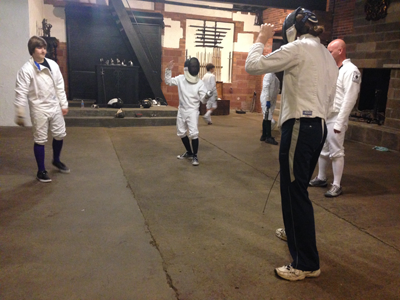Students participate in fencing lessons
![]()
![]() Will Ackermann realized match after match that he was getting closer to winning one of the tournaments held among the members of his fencing academy. His opponent and him had the same amount of indicator points and number of bouts. Earlier in the tournament, this boy had beaten him, so Ackermann had the opportunity to beat this fencer in their final match, a grunt match between the two. He remained tranquil while fencing because the sport allowed his nervous thoughts to be freed from his mind. Remaining cool under the pressure, Ackermann completed his fifth touch on his opponent and won the final match.
Will Ackermann realized match after match that he was getting closer to winning one of the tournaments held among the members of his fencing academy. His opponent and him had the same amount of indicator points and number of bouts. Earlier in the tournament, this boy had beaten him, so Ackermann had the opportunity to beat this fencer in their final match, a grunt match between the two. He remained tranquil while fencing because the sport allowed his nervous thoughts to be freed from his mind. Remaining cool under the pressure, Ackermann completed his fifth touch on his opponent and won the final match.
Three teenagers from Revere High School, Aaron Kelley, Will Ackermann and Daniel Butera, enjoy fencing because of its individuality compared to other sports. Fencing at tournaments and in clubs enables them to meet new people and pick up different techniques.
Ackermann, a sophomore, fences at Kiraly’s Fencing Academy. He started lessons in the summer of seventh grade. Every Wednesday from 6 pm to 9 pm Ackermann attends lessons. Ackermann discussed the challenges beginners face.
“It is kind of weird. Everything you do at first is wrong. [You have to] adjust your stance and adjust how you are holding the sword, but now I am instructing people if there is a new person in class. If you are a beginner, it is really obvious. You basically do not know what you are doing at all. As you get better and better, you get faster,” Ackermann said.
Kelley, a junior, also attends Kiraly’s Fencing Academy in Akron, Ohio. Kelley fenced in sixth and seventh grade, took a break, and returned to fencing his freshman year at Kiraly’s. Kelley explained why he finds fencing so enjoyable and the logistics of the sport.
“I like it because it is different. It is something not a lot of people do. It is really good because it is a good workout. Anyone can do it. You can get people of all ages. Women can fence just as well as men. It is more mental than physical. The instructor describes it as physical chess,” Kelley said.
Kelley’s friend, Dayna Polk, fences in a different club. She belongs to Hooked on Fencing in North Royalton. Polk described her philosophy on fencing.
“Fencing is a talent, not a skill. So, fencers need to come to terms with the fact that [fencing] will consume your social life,” Polk said.
In fencing, there are three main weapons: foil, sabre and epee. Beginners start out with foil. The blade is light and bends easily and comes to a point. When fencing foil, fencers attack just the torso with the point of the blade. Once they master using the foil, they move on to the other two. A sabre has a curved guard to cover the hand and mirrors a cavalry weapon. Saber’s target area falls anywhere above the waist. The point or blade is used to attack. Epee is the heaviest sword and only the tip can be used to hit the target area. With epee, the target area is full body. Kelley explained that epee has the least restrictions when fencing.
“Epee is my favorite. The other two swords have this thing called right of way. You have to claim the right of way before you can attack. If we both hit each other and I claimed the right of way, I would get the point instead of you. In epee that does not apply, so it makes it easier. It is just more fun,” Kelley said.
At Kiraly’s, the members practice the first three weeks of the month or so; then, on the last week, they participate in tournaments. Ackermann talked about the dynamic of the class and a memorable tournament he participated in.
“Everyone in the class is really intelligent. Most of us are pretty leveled out. Two weeks ago, I was having a great day and beat everyone. I was 5-0 in the round robin tournament,” Ackermann said.
In official tournaments, fencers must reach usually fifteen touches to win. However, some matches are just five or ten touches. A touch is when the tip or blade of one fencer’s weapon touches the other fencers target area.
Polk participates in tournaments all over Michigan and Ohio. For tournaments, she practices her footwork to music. Polk explained the process of registering and one of her strategies.
“I can always see who I am fencing at a tournament on a website that you have to pre-register on. So, I will look up some of my competition [and] almost always ask my coaches or club mates if they know how a particular fencer fences, and [ask] what I need to do to beat them,” Polk said.
Polk, Kelley and Ackermann’s fencing in clubs as teenagers helped them gain experience with different fencers and allowed them to learn an individual sport. Fencing may open the doors for them to compete further or just recreationally. Either way, all three teens acquired many memories and skills from fencing.







